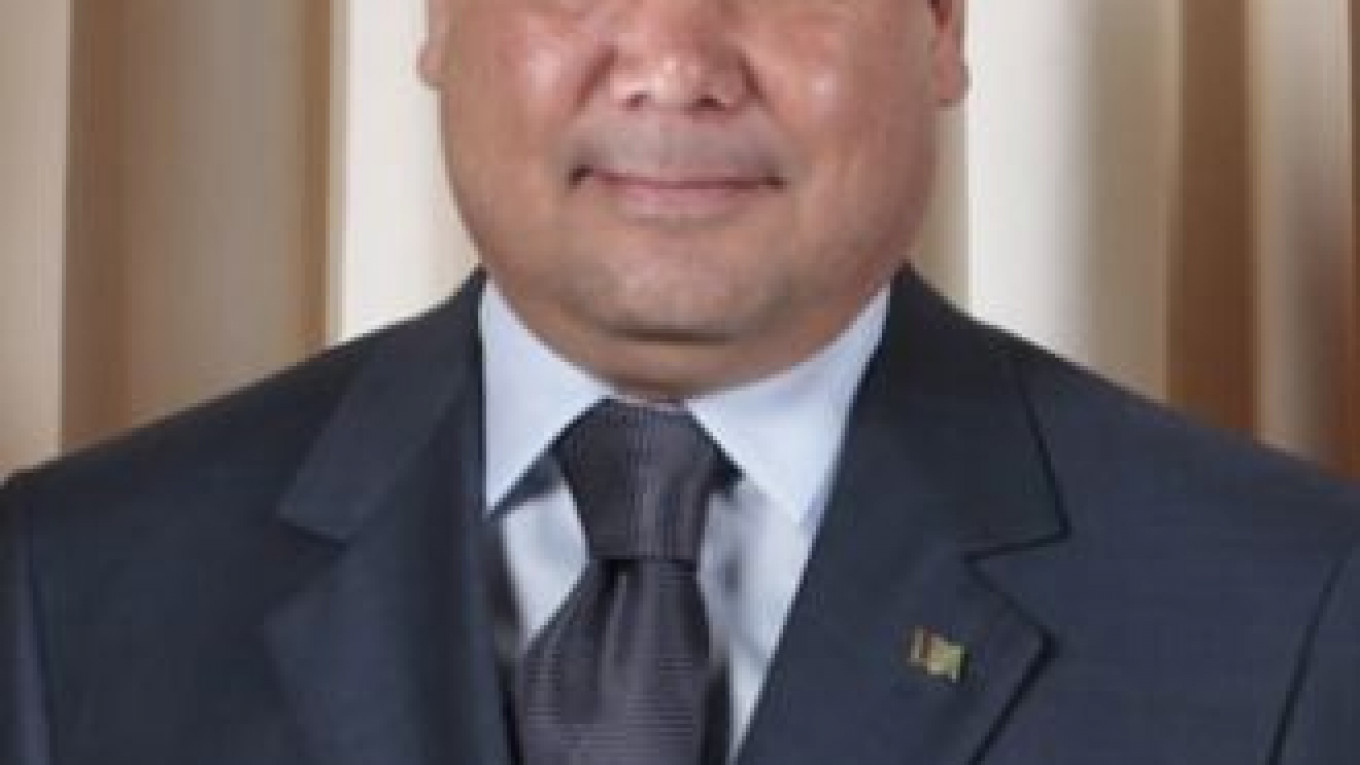ASHGABAT, Turkmenistan — Turkmen lawmakers on Tuesday conferred the title of Hero of Turkmenistan on President Gurbanguly Berdymukhammedov, in a lavish ceremony redolent of the bizarre personality cult of his late predecessor.
Berdymukhammedov, a 54-year-old dentist, wields virtually unlimited power in his Central Asian state of 5.5 million, which holds the world's fourth-largest natural gas reserves and is viewed by rights groups as one of the world's most repressive and isolated nations.
He was swiftly elected president in February 2007 in what the Organization for Security and Cooperation in Europe said at the time "could hardly be called elections," after the sudden death of the country's first post-Soviet leader, Saparmurat Niyazov.
In a sign that victory for Berdymukhammedov in a presidential election set for Feb. 12 will be a formality, a gathering of elders, lawmakers, ministers and selected citizens extolled their leader as a hero and his rule as "paradise on earth."
To the rapturous applause of an audience numbering several thousand, parliamentary speaker Akja Nurberdiyeva said the legislature had supported a motion by the country's elders to grant Berdymukhammedov the title of "Hero of Turkmenistan."
His predecessor Niyazov was given the title six times.
Nurberdiyeva thanked Berdymukhammedov for "strengthening national independence and the international authority of Turkmenistan … and for great reforms."
Turkmenistan, a hermit state where opposition parties are banned and compliant state media extol the president daily, will celebrate the 20th anniversary of its independence from the Soviet Union on Thursday.
"This high decoration obliges me to spare no effort working for the good of our country," Berdymukhammedov said to a standing ovation in the cavernous hall of a new, turquoise-domed and marble-clad palace in the capital, Ashgabat.
The mainly Muslim former Soviet states of Central Asia, with the exception of Kyrgyzstan, have remained under the firm control of autocrats since the Soviet collapse and have seen little of the popular unrest now sweeping the Middle East.
Berdymukhammedov has recently moved to establish warmer ties with the United States and the European Union, both eager to see their energy firms develop huge Turkmen hydrocarbon riches. A pipeline from Turkmenistan across the Caspian Sea is envisioned one day reducing Europe's dependence on gas from Russia.
In a clear hint at the forthcoming election, Berdymukhammedov, addressing the nation, said: "To justify your trust, I will continue working, and I hope that the people will support me in this."
He would grant amnesty to 1,700 prison inmates and Turkmen citizenship to 1,700 people to mark independence, he said.
Many speakers addressed him as "Arkadag," which is interpreted as the Turkmen for "protector" and is often viewed as a state-authorized nickname for the president.
"We live in paradise, and the self-sacrificing work of our president lies in the foundation of everything," said Aigozel Gurbanova, presented as a student of journalism.
Berdymukhammedov's predecessor Niyazov ruled through a mixture of Stalinist repression and eccentric decrees from Soviet times until he died in December 2006, holding the titles of president-for-life and Turkmenbashi, or Head of the Turkmen.
Berdymukhammedov has removed some of the golden statues of Niyazov that dot the nation. But the expressions of popular love at Tuesday's ceremony were similar to those heaped on Niyazov.
"Wherever you tread, the soil turns into an orchard of paradise, and new villages, museums, factories and kindergartens rise there," Shir Sopyev, a resident of the northern Tashauz region, told Berdymukhammedov at the gathering.
A Message from The Moscow Times:
Dear readers,
We are facing unprecedented challenges. Russia's Prosecutor General's Office has designated The Moscow Times as an "undesirable" organization, criminalizing our work and putting our staff at risk of prosecution. This follows our earlier unjust labeling as a "foreign agent."
These actions are direct attempts to silence independent journalism in Russia. The authorities claim our work "discredits the decisions of the Russian leadership." We see things differently: we strive to provide accurate, unbiased reporting on Russia.
We, the journalists of The Moscow Times, refuse to be silenced. But to continue our work, we need your help.
Your support, no matter how small, makes a world of difference. If you can, please support us monthly starting from just $2. It's quick to set up, and every contribution makes a significant impact.
By supporting The Moscow Times, you're defending open, independent journalism in the face of repression. Thank you for standing with us.
Remind me later.






